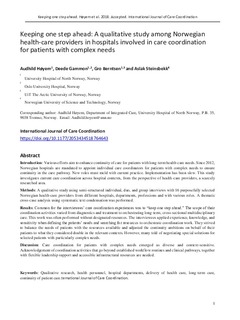| dc.contributor.author | Høyem, Audhild | |
| dc.contributor.author | Gammon, Barbara Deede | |
| dc.contributor.author | Berntsen, Gro Karine Rosvold | |
| dc.contributor.author | Steinsbekk, Aslak | |
| dc.date.accessioned | 2018-09-04T13:23:05Z | |
| dc.date.available | 2018-09-04T13:23:05Z | |
| dc.date.created | 2018-04-08T15:18:33Z | |
| dc.date.issued | 2018 | |
| dc.identifier.citation | International Journal of Care Coordination. 2018, 21 (1-2), 15-25. | nb_NO |
| dc.identifier.issn | 2053-4345 | |
| dc.identifier.uri | http://hdl.handle.net/11250/2560767 | |
| dc.description.abstract | ntroduction Various efforts aim to enhance continuity of care for patients with long-term health-care needs. Since 2012, Norwegian hospitals are mandated to appoint individual care coordinators for patients with complex needs to ensure continuity in the care pathway. New roles must meld with current practice. Implementation has been slow. This study investigates current care coordination across hospital contexts, from the perspective of health-care providers, a scarcely researched area. Methods A qualitative study using semi-structured individual, duo, and group interviews with 16 purposefully selected Norwegian health-care providers from different hospitals, departments, professions and with various roles. A thematic cross-case analysis using systematic text condensation was performed. Results Common for the interviewees’ care coordination experiences was to “keep one step ahead.” The scope of their coordination activities varied from diagnostics and treatment to orchestrating long-term, cross-sectional multidisciplinary care. This work was often performed without designated resources. The interviewees applied experience, knowledge, and sensitivity when defining the patients’ needs and searching for resources to orchestrate coordination work. They strived to balance the needs of patients with the resources available and adjusted the continuity ambitions on behalf of their patients to what they considered doable in the relevant contexts. However, many told of negotiating special solutions for selected patients with particularly complex needs. Discussion Care coordination for patients with complex needs emerged as diverse and context-sensitive. Acknowledgement of coordination activities that go beyond established workflow routines and clinical pathways, together with flexible leadership support and accessible infrastructural resources are needed. | nb_NO |
| dc.language.iso | eng | nb_NO |
| dc.publisher | SAGE Publications | nb_NO |
| dc.title | Keeping one step ahead: A qualitative study among Norwegian health-care providers in hospitals involved in care coordination for patients with complex needs | nb_NO |
| dc.type | Journal article | nb_NO |
| dc.type | Peer reviewed | nb_NO |
| dc.description.version | acceptedVersion | nb_NO |
| dc.source.pagenumber | 15-25 | nb_NO |
| dc.source.volume | 21 | nb_NO |
| dc.source.journal | International Journal of Care Coordination | nb_NO |
| dc.source.issue | 1-2 | nb_NO |
| dc.identifier.doi | 10.1177/2053434518764643 | |
| dc.identifier.cristin | 1578159 | |
| dc.relation.project | Helse Nord RHF: ID 7368/PFP1060-12 | nb_NO |
| dc.description.localcode | © 2018. This is the authors' accepted and refereed manuscript to the article. The final authenticated version is available online at: http://journals.sagepub.com/doi/10.1177/0308518X17711945© 20xx. This is the authors' accepted and refereed manuscript to the article. The final authenticated version is available online at: http://journals.sagepub.com/doi/10.1177/0308518X17711945 | nb_NO |
| cristin.unitcode | 194,65,20,0 | |
| cristin.unitname | Institutt for samfunnsmedisin og sykepleie | |
| cristin.ispublished | true | |
| cristin.fulltext | postprint | |
| cristin.qualitycode | 1 | |
